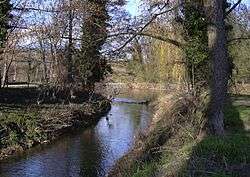Zaber
The ![]()
| Zaber | |
|---|---|
 Zaber at its confluence with the Neckar at Lauffen am Neckar | |
| Location | |
| Country | Germany |
| Physical characteristics | |
| Source | |
| • location | Near Zaberfeld |
| • elevation | 316 m (1,037 ft) |
| Mouth | |
• location | Neckar at Lauffen am Neckar |
• coordinates | 49.0785°N 9.1550°E |
| Length | 22.5 km (14.0 mi) [1] |
| Basin features | |
| Progression | Neckar→ Rhine→ North Sea |
Name
The first mention is from the year 793 as Zabernahgouwe (Zabernachgau). Traditionally it is assumed that the name is derived from the Latin word Taberna ("restaurant", "street station"). It is assumed that the Roman settlement in today's Meimsheim bore this name (similar to the Alsatian place Zabern) and that with time the place name was transferred to the surroundings or to the river.[2] This theory is supported by the fact that there was a traffic junction in Roman Meimsheim and that the place was possibly of administrative importance for the region.
The Zaber gave to the Zabergäu its name.
Geography

Source
The Zaber originates in the district of Heilbronn about two kilometres south-southwest of Zaberfeld on the northern slope of the forested Stromberg (landscape). It flows initially into a reservoir known as the Ehmetsklinge. It subsequently flows in an easterly direction through Zaberfeld, Pfaffenhofen, Güglingen and Brackenheim before reaching the Neckar at Lauffen. The river is shallow and therefore not navigable.
| Name | side of confluence | Length [km][Z 1] |
Basin size in km² |
remaining Length in m |
Location of confluence |
elevation |
Annotations |
|---|---|---|---|---|---|---|---|
| Zaber | – | 22,4 | 113,8 | – | Lauffen am Neckar | 161[3] | |
| Lochwiesenbächle | left | 1,1 | 20.614 | in reservoir Ehmetsklinge (zus. 13,2 ha Nach LUBW-SG10.</ref>) | 232[4] | ||
| Ehmetsklingenbächle | left | 2,6 | 2,3 | 20.359 | in reservoir Ehmetsklinge | 232[4] | länger als Zaber |
| Riesenbach | left | 3,2 | 4,9 | 19.692 | Au W Zaberfeld | 220[5] | |
| Dämmlesgraben | rechts | 1,8 | 19.259 | Zaberfeld, Herrenwiesenweg | 218[5] | im Dorf verdolt | |
| Muttersbach | left | 1,6 | 2,6 | 19.245 | Zaberfeld, Herrenwiesenweg | 218[5] | |
| Katzenbach | rechts | 2,0 | 3,4 | 18.091 | Sportgelände E Zaberfeld | 212[5] | |
| Michelbach (Zaber)Michelbach | left | 4,3 | 6,3 | 17.609 | between Reisenmühle u. Weiler an der Zaber | 203[6] | flows first through a reservoir |
| (Bach aus der Steinenklinge) | rechts | 1,3 | 16.671 | Weiler an der Zaber, Bogersmühle | 202 [7] | ||
| Benzbach | left | 1,4 | 15.522 | In front of roadbrigdge in Pfaffenhofen | 201[5] | ab Dorfrand verdolt | |
| Rodbach | rechts | 2,2 | 2,2 | 15.311 | Sportstätten in Pfaffenhofen | 200[5] | ab Dorfrand verdolt |
| (Zufluss aus der Leopoldsklinge) | rechts | 1,5 | 14.577 | Umspannwerk vor Güglingen | 196[6] | ||
| Flügelaubach | rechts | 3,5 | 3,5 | 12.526 | Güglingen, ggü. Sophienhof | 194[5] | |
| Riedfurtbach | left | 3,8 | 3,4 | 11.476 | Mühle S Güglingen-Frauenzimmern | 191[8] | |
| (Sägmühlkanal) | rechts | 1,3 | 11.444 | Mühle S Güglingen-Frauenzimmern | 190[5] | mit längerem Ast Balzhöfer Bach 2,635 km | |
| Fürtlesbach | rechts | 3,5 | 3,2 | 10.587 | opposite of industrial Estate Güglingen-Frauenzimmern | 188[5] | |
| Wurmbach | left | 4,0 | 7,3 | 9.928 | wastewater treatment plant next to the border of Brackenheim | 185[5] | |
| Forstbach | left | 7,2 | 11,0 | 7.239 | NSG Zaberauen von Meimsheim und Botenheim vor Brackenheim-Meimsheim | 181[5] | |
| Herrenwiesenbach | rechts | 7,4 | 11,1 | 6.738 | uh. Zabergäubahn-bridge net to Brackenheim-Meimsheim | 180[5] | |
| Truselbach | rechts | 3,6 | 5.282 | Brackenheim, Obere Schellenmühle | |||
| Neipperger Bächle | left | 8,9 | 14,1 | 3.828 | wastewater treatment plant before the Lauffener Neckarschlinge | 170[5] | |
Notes
- Nach LUBW-FG10 (Datensatzeinträge).
References
- Map services of the Baden-Württemberg State Office for the Environment, Survey and Conservation (Landesanstalt für Umwelt, Messungen und Naturschutz Baden-Württemberg)
- Albrecht Greule: Deutsches Gewässernamenbuch. Etymology of the names of waters and the corresponding names of areas, settlements and fields. De Gruyter, Berlin 2014, ISBN 978-3-11-019039-7
- Texteintrag in Blau auf der Hintergrundkarte der LUBW-FG10 im Unterwasser der Lauffener Doppelschleuse.
- Texteintrag in Blau auf der Hintergrundkarte der LUBW-FG10 im Hauptsee der Ehmetsklinge.
- Nach dem Höhenlinienbild auf der Hintergrundkarte der LUBW-FG10 abgeschätzt.
- Texteintrag in Blau an der Mündung auf der Hintergrundkarte der LUBW-FG10.
- Interpolated between adjacent values .
- Texteintrag in Schwarz an der Mündung auf der Hintergrundkarte der LUBW-FG10.